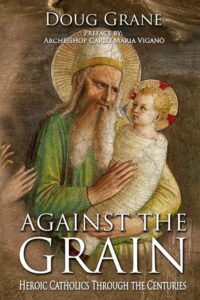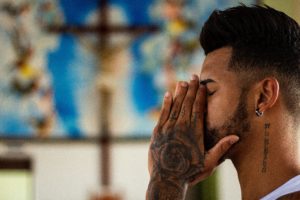But he knew their thoughts and said to them,
“Every kingdom divided against itself will be laid waste
and house will fall against house.
And if Satan is divided against himself, how will his kingdom stand?
For you say that it is by Beelzebul that I drive out demons.
If I, then, drive out demons by Beelzebul,
by whom do your own people drive them out?
Therefore they will be your judges.
But if it is by the finger of God that I drive out demons,
then the Kingdom of God has come upon you….
Whoever is not with me is against me,
and whoever does not gather with me scatters.—Luke 11:17–20, 23
 Each day, every one of us is presented with a decision: Whom will I serve? Will I offer my day up to God, or will I seek to satisfy my own desires and agenda? In this Gospel passage, Jesus warns us that we must choose one or the other—we cannot have both. Even in responding to our own needs, wants, dreams, and goals, if we don’t invite God into those areas of our lives, we will find ourselves working against Him, and all our efforts will be futile.
Each day, every one of us is presented with a decision: Whom will I serve? Will I offer my day up to God, or will I seek to satisfy my own desires and agenda? In this Gospel passage, Jesus warns us that we must choose one or the other—we cannot have both. Even in responding to our own needs, wants, dreams, and goals, if we don’t invite God into those areas of our lives, we will find ourselves working against Him, and all our efforts will be futile.
God has entrusted us with an incredible gift in allowing us to have free will, to make choices that have real consequences in our lives and in the world around us. If we continually offer this gift back to Him, seeking to carry out the will of Jesus, then all the powers of heaven stand alongside us. But if we hold part of ourselves back, trying to keep God out of some aspect of our lives, then we become a house divided. This tension within our soul will cause us to stagnate, holding us back from fulfilling the mission God has placed upon our hearts.
The greater our knowledge, the more responsibility we have to guard ourselves against selfishness and sin, for humans are always tempted to use their gifts for themselves instead of in service to our God and Creator. We must always remember that these gifts do not come from ourselves but are given to us by God, and our truest happiness can only come from offering them back to God in gratitude. To drive out the demons in our lives and curb our tendencies toward sin and self-centeredness, we can choose to be grateful and look for God’s presence in every circumstance we encounter. We can open our hearts to invite God to enter into every aspect of our lives. When we give Him permission, He can and will do great things in us, and through Him, we we will begin to discover our true purpose and identity.
If a thing is free to be good it is also free to be bad. And free will is what has made evil possible. Why, then, did God give them free will? Because free will, though it makes evil possible, is also the only thing that makes possible any love or goodness or joy worth having….
When we have understood about free will, we shall see how silly it is to ask, as somebody once asked me: “Why did God make a creature of such rotten stuff that it went wrong?” The better stuff a creature is made of—the cleverer and stronger and freer it is—then the better it will be if it goes right, but also the worse it will be if it goes wrong. A cow cannot be very good or very bad; a dog can be both better and worse; a child better and worse still; an ordinary man, still more so; a man of genius, still more so; a superhuman spirit best—or worst—of all….
The moment you have a self at all, there is a possibility of putting yourself first—wanting to be the center—wanting to be God, in fact. That was the sin of Satan: and that was the sin he taught the human race….What Satan put into the heads of our remote ancestors was the idea that they could “be like gods”—could set up on their own as if they had created themselves—be their own masters—invent some sort of happiness for themselves outside God, apart from God. And out of that hopeless attempt has come nearly all that we call human history—money, poverty, ambition, war, prostitution, classes, empires, slavery—the long terrible story of man trying to find something other than God which will make him happy.
—C.S. Lewis, Mere Christianity
—
Image: Odilon Redon, The Winged Man (The Fallen Angel) / PD-US
Originally posted at Frassati Reflections.
Photo by Vladislav Babienko on Unsplash / PD-US.





